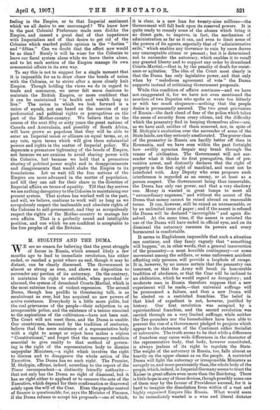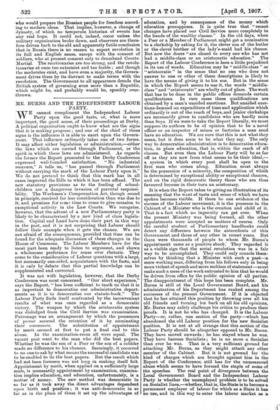M. STOLYPIN AND THE DITMA.
E see no reason for believing that the great struggle
of forces in Russia, which seemed likely a few' months ago to lead to immediate revolution, has either ended, or reached a point where an end, though it may be distant, can be clearly discerned. The Government is' almost as strong as ever, and shows no disposition to surrender any portion of its autocracy. On the contrary, it maintains its right to establish, when provoked or alarmed, the system of drumhead Courts-Martial, which is the most extreme form of violent repression. The second Duma, though less prolific in threatening talk, is as recalcitrant as ever, but has acquired no new powers of active resistance. Everybody is a little more Rolite, but the real grievances of the people—their subjection to an irresponsible police, and the existence of a tenure unsuited to the aspirations of the cultivators—have not been met. The Court will not meet them, and the Duma is unable. Our countrymen, bemused by the tradition of centuries, believe that the mere existence of a representative body with a right to accept or reject laws makes a rdginie " Constitutional," and forget that the necessary condition essential to give reality to that method of govern- ing is the right of the representative body to dismiss unpopular Ministers,—a right which involves the right to discuss and to disapprove the whole action of the Executive. The Duma has no such right. The Premier, M. Stolypin, affirms, indeed, according to the report of the Times correspondent—a distinctly friendly authority— that not only has the Puma no right of dismissal, but it has no right either to applaud or to censure the acts of the Executive, which depend for their confirmation or disavowal solely upon the will of the Czar. Even the popular control of finance is questionable, for, says'the Minister of Finance, if the Duma refuses to accept his proposals ,one of 'which,
it is clear, is a new loan for twenty-nine millions—the Government will fall back upon its reserved powers. It is quite ready to remedy some of the abuses which bring it no direct gain, to improve, in fact, the mechanism of administration as far as it can, and even to limit some of the powers of its agents, especially that of " administrative exile," which enables any Governor to ruin by mere decree any unacceptable citizen or peasant ; but it is determined not to surrender the autocracy, which enables it to recall any granted liberty'and to support any order by drumhead Courts-Martial,—that is, by the penalty of death for resist- ance or agitation. The idea of the Court most clearly is that the Duma has only legislative power, and that only when by " melodious agreement of vote " the Duma supports instead of criticising Government proposals.
While this condition of affairs continues—and we have not exaggerated it, for we have not even mentioned the murders of two Deputies who spoke or wrote too bitterly or with too much eloquence—nothing that the people desire is permanently assured. The two great grievances of Russia—the dark cloud of fear of the police which takes the sense of security from every citizen, and the difficulty which the peasantry find in keeping themselves alive—are, as we have said, neither of them removed, nor, in spite of M. Stolypin's exultation over the surrender of some of the State lands, are they seriously ameliorated. The poorer class of the peasantry in• Russia are hardly better off than in Roumania, and we have seen within the past fortnight how • swiftly agrarian despair may break through the veneer of civilisation. The Government will not sur- render what it thinks its first prerogative, that of pre- ventive arrest, and distinctly declares that the right of property is the first right of mankind, and must not be interfered with. Any Deputy who even proposes such interference is regarded as an enemy, or at least as a person suspect. The Government being thus immovable, the Duma has only one power, and that a very shadowy one. Money is wanted in great lumps to meet all " extraordinary expenses," and without the assent of the Puma that money cannot be raised abroad on reasonable terms. It can, however, still be raised on unreasonable, or by an unlimited issue of paper ; and if the assent is refused the Duma will be declared " incorrigible " and again dis- solved. At the same time, if the assent is extorted the use of the Duma will have ended in official eyes, and on its dismissal the autocracy resumes its powers and every bureaucrat is comfortable.
It seems to Englishmen impossible that such a situation can- continue, and they fancy vaguely that " something will happen," or, in other words, that a general insurrection of the peasantry—a most horrible contingency—or some movement among the soldiers, or some unforeseen accident affecting only persons, will provide a loophole of escape. It is, however, by no means certain that the peasantry can insurrect, or that the Army will break its honourable tradition of obedience, or that the Czar will be inclined to an abdication, which he would regard as derogatory ; and moderate men in Russia therefore suppose that a new experiment will be made,—that universal suffrage will be pronounced a failure, and that a new Duma will be elected on a restricted franchise. The belief in that kind of expedient is not, however, justified by history. Our first revolution was accepted by a squirearchical franchise, and the second revolution was carried through on a very limited suffrage, while neither the Ten-pounders nor the householders have been able to prevent the rise of a Government pledged to projects which appear to the statesmen of the Continent either Socialist or subversive. The truth seems to be that while a difference of franchise may cause wide differences in the character of the representative body, that body, however constituted, is always jealous of its right to regulate the State. The weight of the autocracy in Russia, too, falls almost as heavily on the upper classes as on the people. A restricted Duma will fight the autocracy or irresponsible Ministers as savagely as, and more persistently than, the whole body of the people,which, indeed, in Imperial Germany seems to trust the Kaiser in great affairs even more than the Reichstag. There is little hope in any of these devices, though possibly some one of them may by the favour of Providence succeed, for it is hard to imagine the dissolution from within of a vast and highly organised Empire like Russia. What would seem to be immediately wanted is a wise and liberal dictator
who would prepare the Russian people for freedom accord- ing to modern ideas. That implies, however, a change of dynasty, of which no temperate historian of events has any real hope. It could not, indeed, occur unless the military organisation broke down, and observers are there- fore driven back to the old and apparently futile conclusion that in Russia there is no reason to expect revolution in its full and English sense, except with the consent of soldiers, who at present consent only to drumhead Courts- Martial. The reactionaries are too strong, and the revolu- tionaries at once too extremist and too feeble ; and though the moderates exist, and have even a majority, the Govern- ment drives them by its distrust to make terms with the revolution. The Government to all appearance dreads the British system of governing even more than a Republic, which might be, and probably would be, speedily over- thrown.











































 Previous page
Previous page